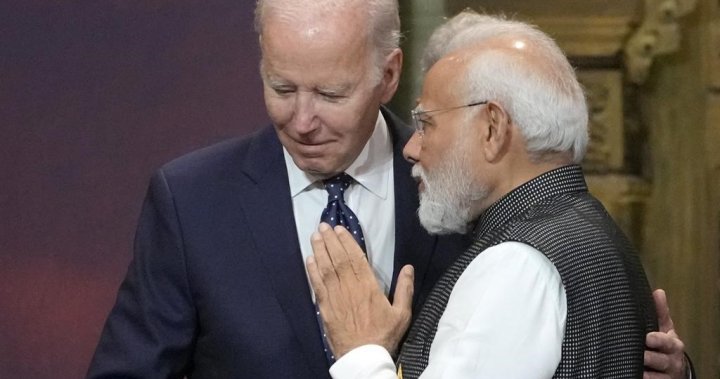
Canada’s India allegation puts U.S. in ‘difficult’ spot as it seeks deeper ties
Global News
The Biden administration has been careful to not condemn India over accusations its agents were involved in the murder of a Sikh leader and Canadian citizen in B.C.
Canada’s allegation that there is evidence agents of India’s government may have behind the killing of a Sikh leader on Canadian soil have put the U.S. in what experts say is a “difficult” bind as it seeks deeper economic ties with the South Asian superpower.
The Biden administration has said little publicly about Prime Minister Justin Trudeau’s astonishing announcement Monday that “credible intelligence” suggests a link between the Indian government and the June murder of Hardeep Singh Nijjar, a Canadian citizen and supporter of the Khalistan movement that is pushing for the creation of a separate Sikh state.
That’s because the U.S. doesn’t want to strain its own relations with Indian Prime Minister Narendra Modi as it pursues its Indo-Pacific strategy to counter China’s rise and forge new trade and diplomatic relations in the region — a strategy that is heavily reliant on India.
“It’s put the U.S. in a very difficult place,” said Jonathan Miller, a senior fellow and director of foreign affairs at the Macdonald Laurier Institute.
“I don’t envision the Americans stepping out too drastically on this issue … until or unless there is some very, very definitive proof.”
Trudeau’s announcement in the House of Commons sparked fierce condemnation from Canadian politicians and tit-for-tat expulsions of diplomats from Canada and India, which fiercely denied the allegation as “absurd and motivated.”
But the White House was careful to note the investigation into Nijjar’s murder has yet to be resolved in comments that urged India to cooperate — all without condemning the alleged link.
“We are deeply concerned about the allegations referenced by Prime Minister Trudeau,” White House National Security Council spokesperson Adrienne Watson said in a statement.





